Losing all or most of your teeth can be a life-altering experience, significantly impacting your ability to eat, speak, and smile confidently. Fortunately, advancements in dentistry have led to the development of full mouth dental implants, a revolutionary solution that offers a permanent and functional replacement for missing teeth. While the prospect of regaining a healthy, beautiful smile is enticing, the cost of full mouth dental implants can often be a significant hurdle for many individuals. This comprehensive guide aims to shed light on the intricate factors that influence the price of full mouth dental implants, providing a clear understanding of the various components involved and offering strategies for finding affordable solutions.
Factors influencing the cost of full mouth dental implants
The cost of full mouth dental implants varies significantly depending on several factors, including individual patient needs, the complexity of the procedure, and the chosen treatment plan. Understanding these variables can help you make informed decisions and prepare for the investment involved.
Number of implants needed
Perhaps the most fundamental factor influencing the cost of full mouth dental implants is the number of implants required. Replacing a full set of teeth often necessitates multiple implants, potentially ranging from four to 14 or more, depending on the chosen implant technique and individual bone structure.
The more implants needed, the higher the overall cost will be. For instance, patients opting for methods like All-on-Four only need four implants to support an entire arch of teeth, while traditional methods may require one implant per missing tooth. This fundamental difference in approach not only affects costs but also influences the surgical complexity and recovery time.
It’s important to note that the decision on the number of implants should be made in consultation with a qualified dental professional, who can assess your unique dental health and recommend the most suitable plan.
Type of implants used
Dental implants are available in a variety of materials and designs. While titanium implants are the most common and generally considered the gold standard due to their biocompatibility and durability, other options like zirconia implants are gaining popularity for patients with metal allergies.
The specific type of implant chosen can impact the overall cost, as some materials or specialized designs command a premium. For instance, zirconia implants tend to be more expensive than their titanium counterparts, but they offer aesthetic advantages and are ideal for individuals concerned about metal sensitivity. As such, it’s essential to weigh the benefits of each material against its cost and discuss these aspects with your dentist to ensure that you make an informed choice.
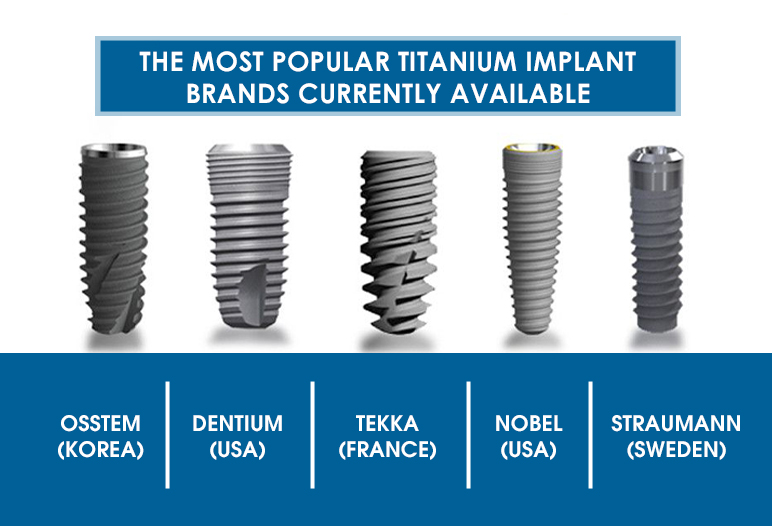
Bone grafting and sinus lifts
Before implant placement, patients with insufficient bone density in the jaw may require bone grafting or sinus lifts. These procedures are designed to prepare the jawbone to securely support the implants, enhancing the success rate of the implant procedure.
Bone grafting involves transplanting bone tissue to strengthen the jaw, thereby making it possible to place implants successfully. In contrast, sinus lifts extend the sinus floor to create additional bone height in the upper jaw. Both procedures add significant costs to the overall treatment, as they require additional surgical time, materials, and expertise.
Additionally, if bone grafting is necessary, the total treatment time may increase, leading to further indirect costs, such as additional consultations and recovery periods. Patients should consider these factors when evaluating the cost of full mouth dental implants.
Prosthetic options (Dentures, Bridges)
Once the implants are placed and integrated with the jawbone, a prosthetic component is attached to restore the appearance and functionality of the teeth. Several prosthetic options exist, including dentures, bridges, and fixed hybrid prostheses.
The type of prosthetic chosen can influence the overall cost, with fixed bridges and customized dentures typically being more expensive than simpler options. Fixed hybrid prostheses, which offer both stability and aesthetics, may also come at a premium compared to removable alternatives. Therefore, understanding the differences and associated prices of each prosthetic option can help you make a well-rounded decision that fits both your functional needs and budget.
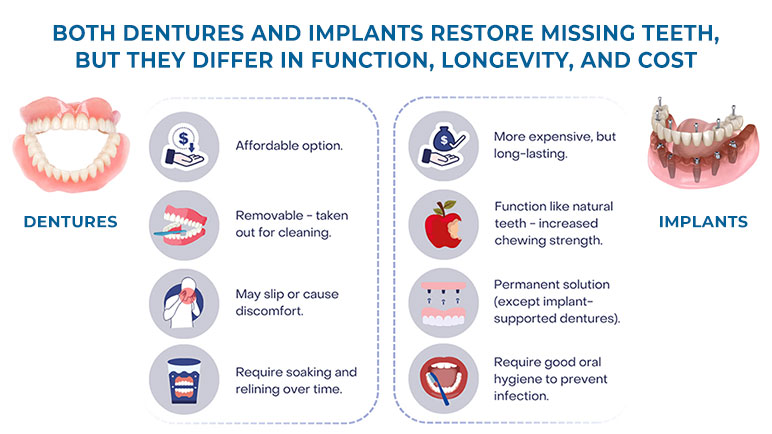
Geographic location and dental practice
The cost of full mouth dental implants can vary significantly based on your geographic location and the dental practice you choose. Practices located in areas with a higher cost of living or those with a high concentration of specialized implant dentists may tend to have higher fees compared to practices in more rural areas or those utilizing a more traditional approach.
In addition to location, the experience, reputation, and technology utilized by the dental practice can also impact the cost. A renowned implant specialist with state-of-the-art equipment might charge more than a general dentist offering implant services. It’s essential to balance quality and cost in your decision-making process, ensuring that you receive the best care without overspending.
Breaking down the costs: Individual components
Breaking down the overall cost of full mouth dental implants into its individual components provides a clearer understanding of where your money is going.
Implant placement surgery
This is arguably the most expensive part of the process, involving surgical procedures to place the implants into the jawbone. The cost involves surgical time, materials like implants and bone grafting materials (if needed), and post-operative care.
The complexity of the surgery—number of implants, bone grafting or sinus lift procedures, and any other unforeseen challenges encountered—directly impacts the cost of full mouth dental implants. Surgeons with extensive experience may charge more due to their skill level, but this investment often translates to better outcomes and fewer complications. Thus, weighing the potential benefit of expertise against the expense should be a priority during your planning.
Implant components (Abutments & Crowns)
Once the implants are integrated into the jawbone, abutments and crowns are attached to complete the restoration. Abutments act as a connector between the implant and the crown, while crowns are the visible and functional part of the tooth replacement.
The materials used, the complexity of the design, and the number of crowns and abutments required can significantly influence the cost of this component. For example, custom-designed crowns made from high-quality porcelain or ceramic will typically cost more than standard options but offer superior aesthetics. Investing in high-quality crowns can provide long-term satisfaction, as they not only enhance the smile but also maintain function over time.
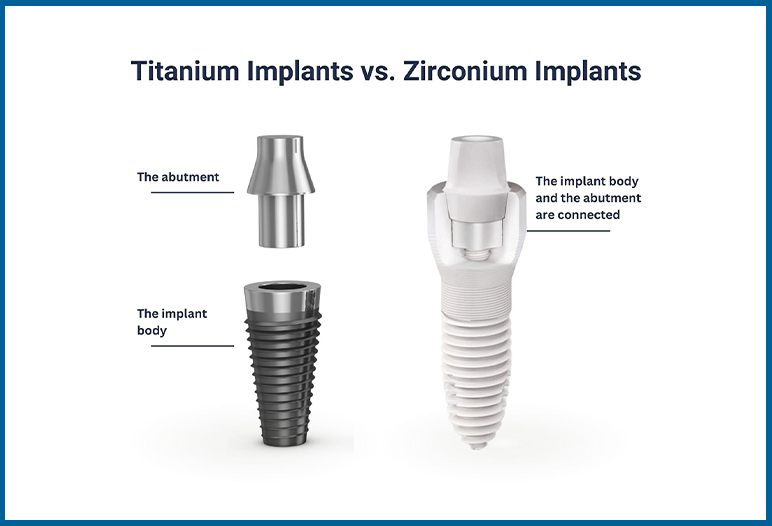
Consultation and diagnostic procedures
Before starting any treatment, a thorough consultation and diagnostic process is essential to assess your oral health and develop a personalized treatment plan. This involves X-rays, CT scans, impressions, and detailed discussions about your expectations and goals.
These preliminary procedures are essential but contribute to the overall dental implants cost. Though they may seem like an added expense, investing in a comprehensive evaluation can save you money in the long run by identifying potential issues before treatment begins. Consulting with a knowledgeable dental professional can clarify the necessity of these steps and how they fit into your overall budget.
Anesthesia costs
The type of anesthesia used during the implant surgery can also affect the cost. While local anesthesia might be sufficient for some cases, others may require intravenous sedation or general anesthesia, which are associated with higher costs due to the involvement of an anesthesiologist and monitoring equipment.
Understanding your individual comfort levels and discussing them with your dental provider is crucial. While the upfront cost may be higher for advanced sedation techniques, ensuring a pain-free experience could lead to a smoother recovery and enhance your overall satisfaction with the procedure.
Cost comparisons: Different implant options
Full mouth dental implants offer diverse treatment options, and the cost can vary considerably depending on the chosen technique.
Traditional dental implants
This approach involves placing individual implants for every missing tooth, offering a highly robust and predictable outcome. While this method achieves excellent results, it necessitates multiple surgical procedures, potentially extending the treatment timeline and increasing cost.
The average cost of dental implants under this method can be quite steep, with many patients facing expenses that can exceed their initial budget. However, it’s worth noting that the longevity and durability of these implants can justify the investment over time, especially when considering the potential costs associated with ongoing dental issues stemming from untreated tooth loss.
All-on-Four implants
The All-on-Four technique involves placing only four implants to support a full arch of teeth, significantly reducing the number of surgeries and overall treatment time. This approach is particularly appealing for patients with extensive bone loss.
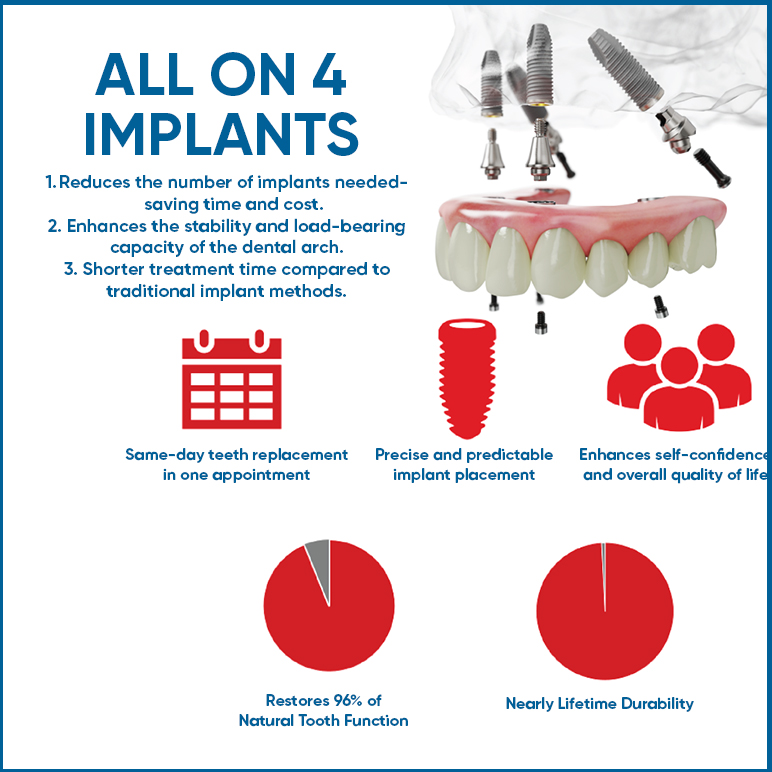
Since fewer implants are required, the cost of full mouth dental implants is generally lower compared to traditional full mouth implants. This technique not only offers a more affordable solution but also has the advantage of faster healing times, making it an attractive option for many patients. Discussing this option with your dentist can help you determine whether it’s a viable choice for your unique circumstances.
Zygomatic implants
Zygomatic implants are an advanced solution for patients with severe bone loss in the upper jaw. These longer implants anchor to the cheekbones, providing stability and support for the prosthesis.
Due to the complexity and specialized skills required for zygomatic implant placement, they are usually the most expensive option, with costs often reaching the higher end of the spectrum. However, they can be a lifesaver for individuals who would otherwise be unable to undergo standard implant procedures due to inadequate bone structure. As with any treatment, it’s essential to conduct thorough research and consult experienced professionals to assess if zygomatic implants are right for you.
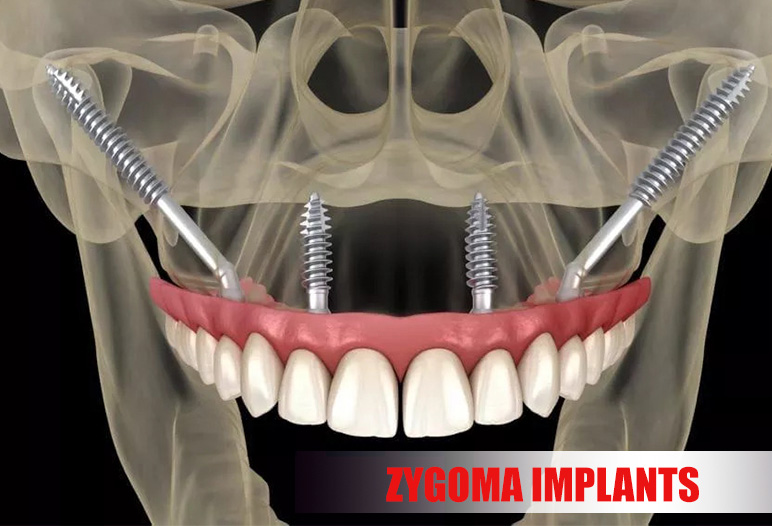
Budgeting for full mouth dental implants
The cost of full mouth dental implants is a significant investment, demanding careful planning and budgeting.
Setting a realistic budget
Before seeking treatment, it’s crucial to understand the potential cost range based on your individual needs and the chosen treatment plan. Discussing your budget limitations with your dentist during the initial consultation is essential.
Having open and honest conversations about financial constraints can help your dentist tailor recommendations that align with your budget. By exploring different options and payment plans, you can work toward achieving your desired results without overstretching your financial resources.
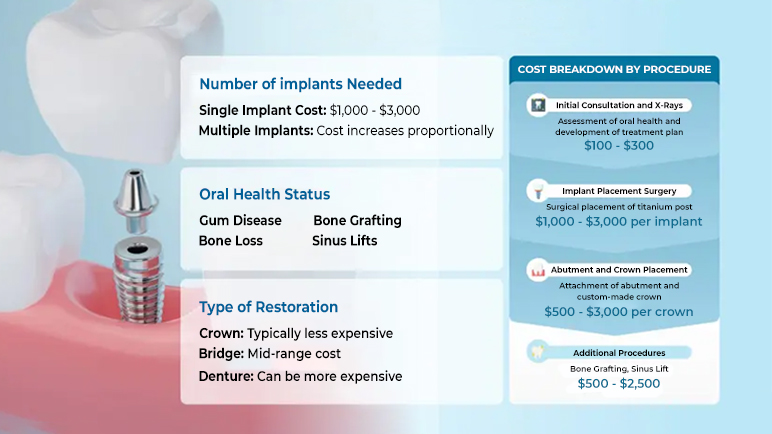
Exploring financing solutions
Many dental practices offer financing plans or work with third-party lenders to help patients manage the cost of full mouth dental implants. These options often involve monthly payment plans with varying interest rates.
Researching available financing options and comparing interest rates and terms before committing to a plan is crucial. Some practices might even offer in-house financing, which could streamline the approval process and reduce the burden of dealing with external lenders. Being proactive in exploring financing opportunities allows you to take control of your dental health journey without feeling overwhelmed by costs.
Prioritizing and phasing treatment
If the cost of full mouth dental implants seems overwhelming, consider prioritizing and phasing the treatment. This could involve replacing the most problematic teeth first and then gradually moving towards restoring the entire mouth.
Phased treatment allows you to manage the financial burden in smaller, more manageable installments. Additionally, this strategy enables you to evaluate the effectiveness of each phase and make adjustments to your treatment plan as needed. Collaborating with your dental provider to outline a phased approach can facilitate a smoother transition toward achieving a beautiful and functional smile.
Tips for finding affordable full mouth dental implants
While achieving a beautiful, functional smile with full mouth dental implants is a valuable investment, finding affordable options doesn’t necessarily compromise the quality of treatment.
Researching dental professionals
Thorough research is key to finding qualified and experienced implant dentists who offer competitive pricing. Look for dentists specializing in implant dentistry with a proven track record and positive patient reviews.
Online resources like the American Academy of Implant Dentistry (AAID) can be helpful in finding qualified professionals near you. Additionally, reading testimonials and case studies can provide insights into previous patient experiences, helping you gauge the skill level and reliability of a potential dentist.
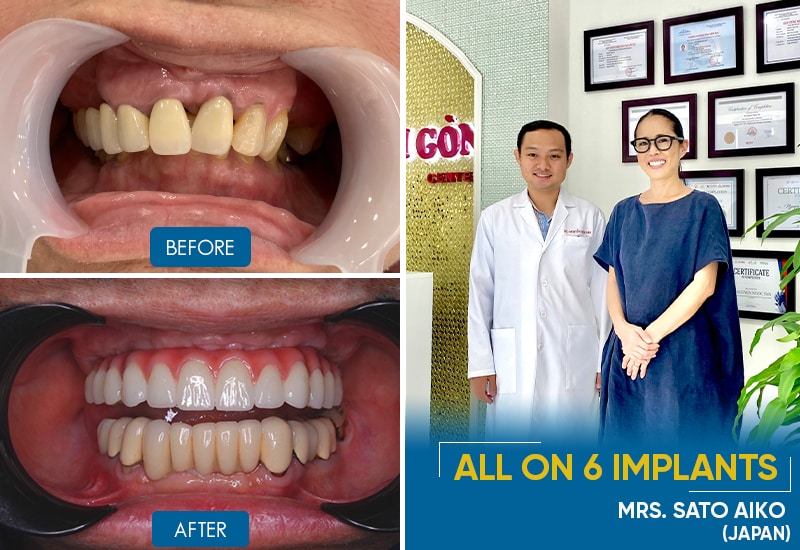
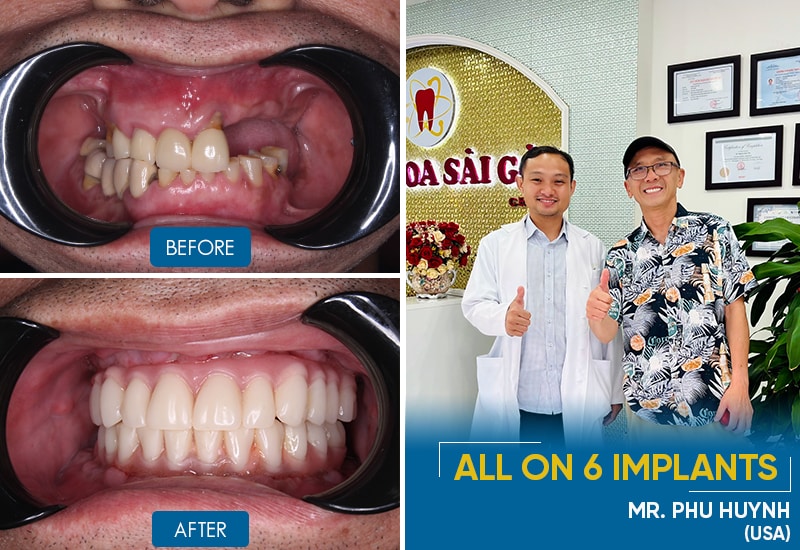
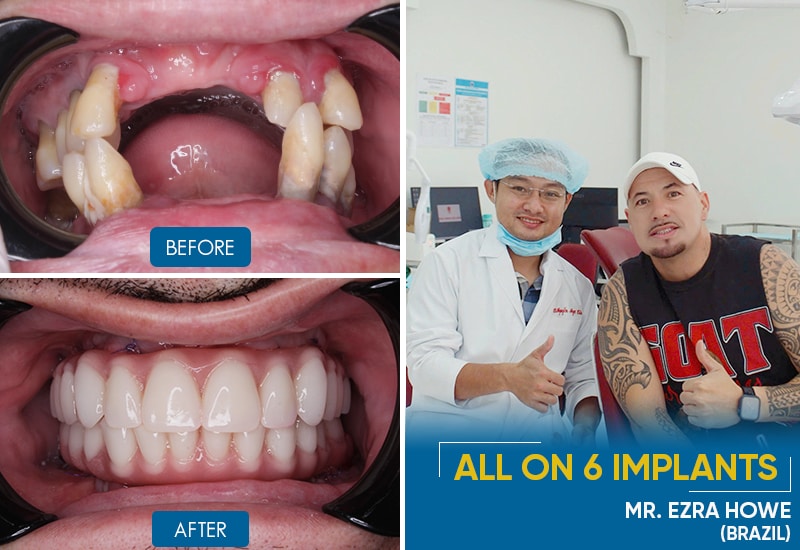

Inquiring about special offers and discounts
Many dental practices offer special offers, discounts, or payment plans to make treatment more affordable. Don’t hesitate to inquire about any available options, including senior discounts, military discounts, or payment plans.
Being upfront about your financial situation can sometimes yield unexpected opportunities for savings. Many practitioners understand that affordability is a concern for many patients, and they may have flexible options available to accommodate your needs.
Considering dental schools and teaching hospitals
Dental schools and teaching hospitals often offer implant services at a reduced cost supervised by experienced faculty. These options provide an excellent opportunity to receive high-quality care at a more affordable rate, although appointment availability and treatment times might be longer due to the educational aspect of the environment.
Choosing to pursue treatment in a learning environment can still yield satisfactory results while reducing costs. Just ensure you feel comfortable with the supervision level and understand the potential time commitment involved in the treatment process.
Conclusion
In conclusion, the cost of full mouth dental implants is influenced by a myriad of factors, from the number and type of implants used to the specific prosthetic options chosen, as well as geographical location and the expertise of your dental provider. Understanding the breakdown of costs and exploring various ways to budget can empower you to regain your smile without compromising quality. With diligent research, open communication, and strategic planning, achieving a beautiful, functional smile through full mouth dental implants is entirely within reach, allowing you to transform your life and confidence.

 Google Reviews
Google Reviews Call
Call
SAIGON IMPLANT CENTER
Best dentist in Vietnam
Saigon Implant Center - Dental Clinic utilizes the latest technology for specialized treatment in the field of Single implant, full jaw implants, All on 4 implants, All on 6 implants, Zygoma implant....
SAIGON IMPLANT CENTER
Best dentist in Vietnam
Saigon Implant Center - Dental Clinic utilizes the latest technology for specialized treatment in the field of Single implant, full jaw implants, All on 4 implants, All on 6 implants, Zygoma implant....